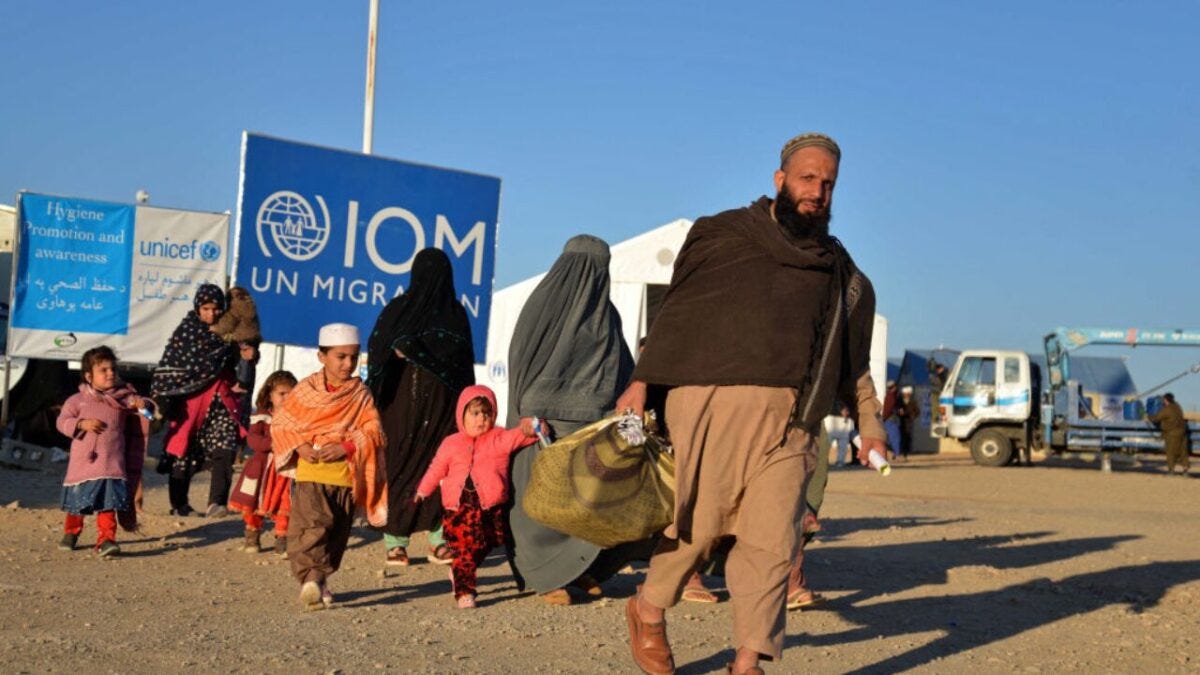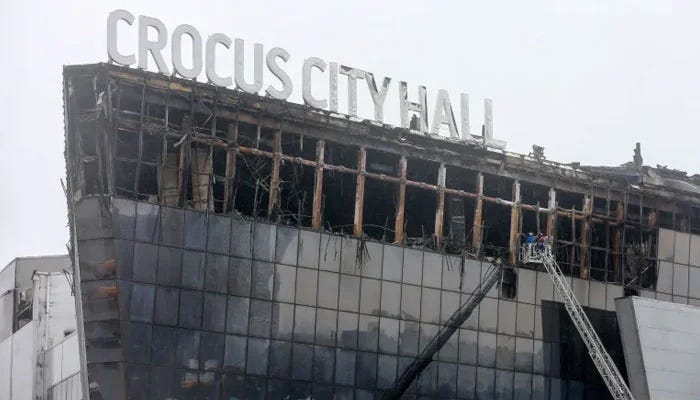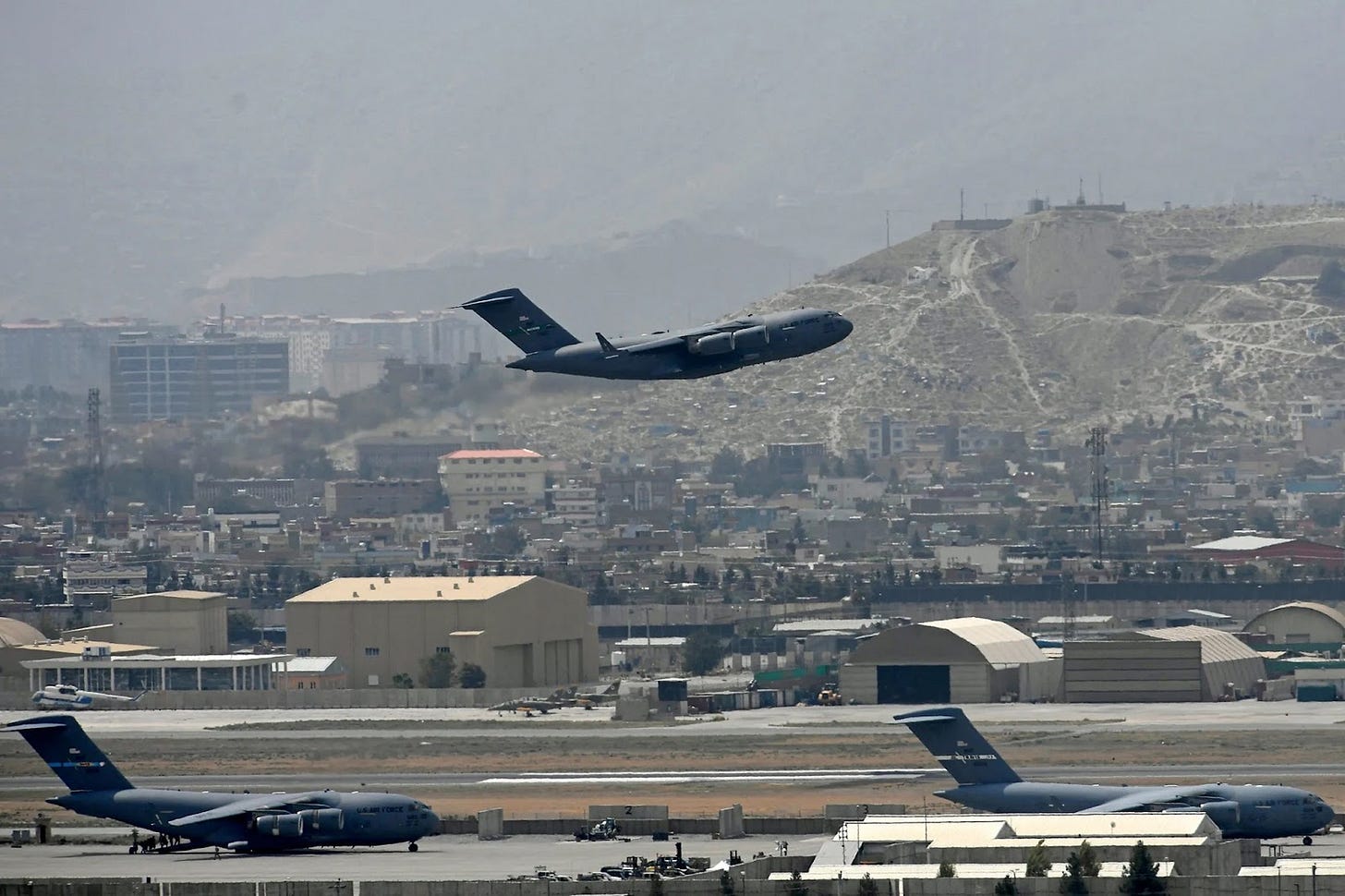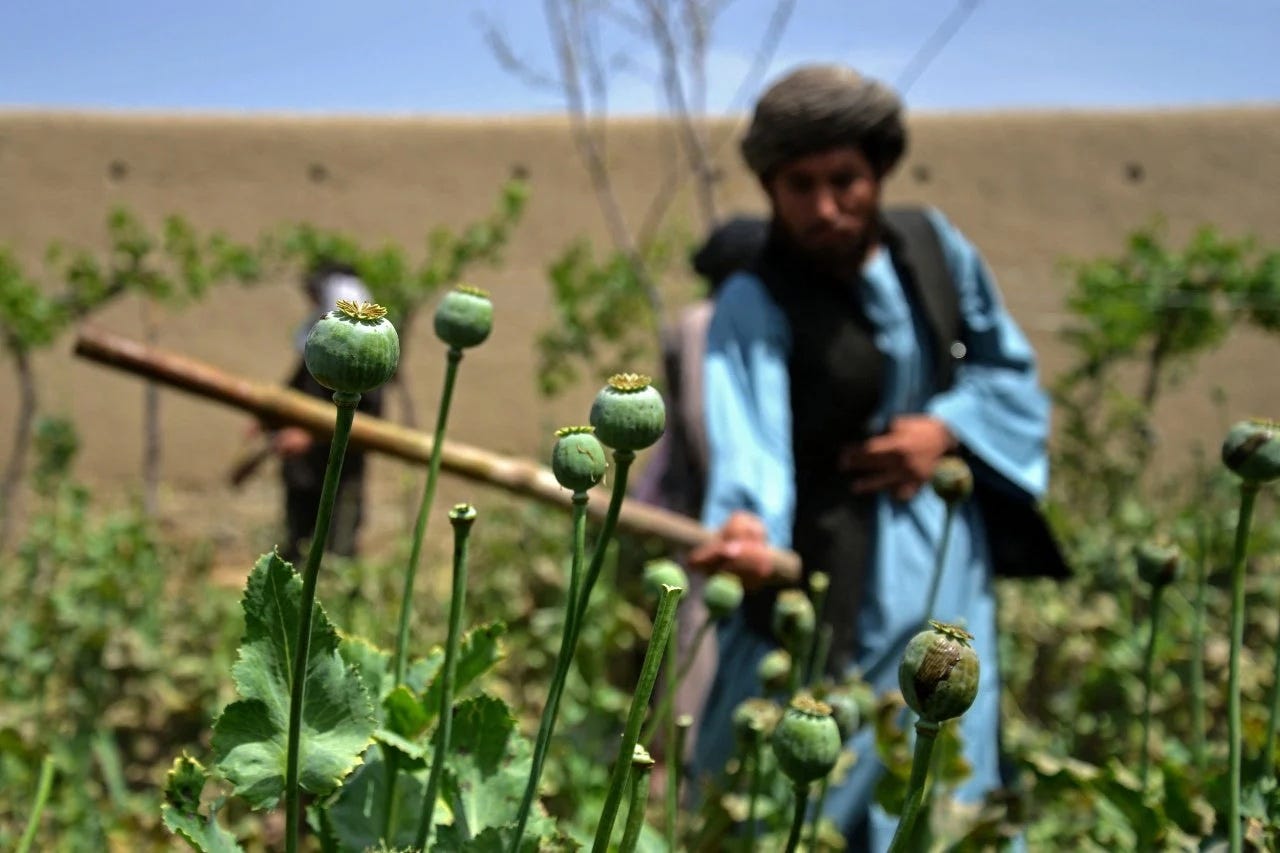Security and Conflict
Protest in Lashkar Gah – On Sunday, shopkeepers in Gereshk, Helmand, protested against the Taliban Mayor’s demolition of shops and Taliban harassment, calling for the Mayor’s removal. The Mayor’s guards responded by beating the protestors and firing at the crowd, leaving one person injured.
Drones surveilling Mullah Hibatullah – Drones flying over the office of Mullah Hibatullah in Kandahar on Tuesday led to his relocation to Panjwai for increased security. The presence of these drones was interpreted as a significant threat, which resulted in the decision to move him to the Tolakan military base in Panjwai district for safety.
Shooting in Farah – On Thursday, in Tokali village, Pusht Koh district of Farah, three individuals were shot and killed as they left the mosque after prayers. Among the casualties was the influential Hizb-e-Islami figure, Haji Akbar. Farah's security commander, Abdul Zaher Khadem, confirmed the incident and announced that investigations are ongoing.
Release of Prisoners – The Taliban in Afghanistan announced the release of 2,000 prisoners for Eid ul-Fitr, as stated by Abdul Wali Mahmood of the court inspection department. This decision precedes the identification of eligible detainees, with unclear charges and detention lengths. Additionally, 103 were already freed from Kandahar Prison for Eid.
Human Rights and Civil Liberties
Arrests for Political Activity – On Thursday, two individuals were sentenced to 15 years in prison for their involvement in political activities, following several statements by the Taliban leadership that political parties have been disbanded and are prohibited under the current regime.
ANSF Death – A former ANSF soldier, Zia-ul-Rahman Ayazi, died on Sunday at Abu Ali Sina Balkhi hospital in Mazar after being released from detention by the Taliban. Mr. Ayazi exhibited signs of extreme torture at the time of his death.
ANSF Detention – On Saturday, the Taliban arrested 2 former ANSF soldiers, Maroof Atayi and Sebghatullah Atayi in Kohistan, Faryab.
Professor Arrested – Najibullah Jamil, a university professor and critic of the Taliban, initially supported the regime but later shifted to openly criticize their oppressive policies, especially their stance against girls' education. Following a summons, he was detained by the Taliban's intelligence agency, a move that has sparked widespread condemnation across social media platforms. His arrest is indicative of the Taliban's broader crackdown on dissent and human rights violations, leading to international calls for the release of detained activists and critics.
Rezaei Siblings Released – The Rezaei siblings, Azadeh, Nadia, Elaheh, and Yahya, were released from Taliban custody on Monday, as their family confirmed. They had been arrested after a Taliban raid on their home, an action reportedly tied to their activities in human rights activism. Following their release, the family has yet to provide details regarding the siblings' health.
Floggings – On Saturday in Logar province, 6 individuals were flogged for alleged moral crimes including accusations of adultery and sodomy.
Internal Politics
Dissatisfaction with the Purification Committee – Dr. Bashir, a prominent former Taliban intelligence chief in Nangarhar and an influential commander, openly criticized the Taliban's Purification Commission at a ceremony for its arbitrary dismissals. He expressed concerns over growing dissatisfaction within the Taliban, advocating for the integration of both Taliban members and families affected by ISIS activities. These remarks come as the Taliban's Defense Minister, Yaqoob Mujahid, leads a purification effort aimed at securing the group's ranks against ISIS infiltration. This initiative, which has also unfolded in Maidan Wardak, has sparked criticism for perceived biases and failure to acknowledge the contributions of members from certain regions, highlighting internal divisions and challenges.
Pensions Ended – The supreme leader of the Taliban has ordered the Ministry of Finance to stop pension deductions from the salaries of employees. Additionally, the decree mandates the ministry to compile reports detailing the employment start date, length of service, and total amount deducted from the salaries of all military and civilian employees under the current government.
International Meetings and Developments
World Bank Funding – The World Bank has allocated $16 million to support Afghan women entrepreneurs and their businesses. According to World Bank President Melinda Good, this initiative is designed to provide loans to female entrepreneurs, assist small taxpayers, and facilitate the digitization of enterprises. It aims to empower women to restart their ventures and stimulate the revival of the private sector.
UNHCR Request for FUNDS to Support Afghans – The UNHCR has announced a call for $620 million in funding to support its 2024-2025 Regional Refugee Response Plan, aimed at assisting 4.8 million Afghan refugees alongside 2.5 million members of host communities in Iran and Pakistan. These countries, currently home to about 7.7 million Afghans, are grappling with significant challenges in providing adequate support, influenced by complex economic conditions, security concerns, and the need for protection.
Freedom of the Press
Journalist Detained – Journalist Bashir Hatif, known for his criticism of the Taliban's approach to the media and his advocacy for journalists' rights in Afghanistan, was detained by the Taliban intelligence in Kabul on Wednesday. The detention, lasting six hours and reportedly due to his media activities, involved insult and humiliation, according to sources. Hatif's involvement with the Media Violations Commission and the Federation of Afghan Journalists and Media Organizations, both under pressure for supporting female journalists, underscores the risks faced by those challenging the status quo.
Journalist released – After spending 134 days in Daikundi prison, Sultan Ali Jawadi, the former manager of Nasim Radio, was released by orders from Taliban leader Mullah Hebatullah Akhundzada as part of an Eid al-Fitr amnesty. His arrest on charges of propaganda and espionage underscores the significant challenges to press freedom in Afghanistan. Nasim Radio, which was shut down in 2023, has recently reopened in March 2024 under new conditions, highlighting the ongoing tension between media operations and the stringent policies of the current regime.
Taliban Diaspora Propaganda – The Taliban's Ministry of Foreign Affairs (MOFA) has reportedly strategized to sway the Afghan diaspora in the West using proxies, following unsuccessful attempts to seize Afghan diplomatic missions. Allegedly, they have cataloged Afghan community groups abroad, including popular social media personalities, and made connections to influence these groups. A leaked statement from a Taliban MOFA official suggests that there are plans to leverage these organizations. Furthermore, messages from the Taliban offering payment to individuals for cooperation have emerged.
Regional Developments
Forced Repatriation from Iran – In the past two months, between 110,000 and 120,000 Afghan migrants were forcibly repatriated from Iran, as reported by Abdullah Riyadh, the head of Migrants and Returnees in Nimroz. Assistance for these returnees is being provided at the border by partner organizations in collaboration with the Islamic Emirate. Many of the deported migrants have highlighted a pressing need for employment opportunities within Afghanistan to deter further migration and have voiced complaints about mistreatment by Iranian security forces. This situation underscores the dire circumstances faced by Afghan migrants in Iran.
Health and Travel
Illness Outbreak – Recent floods in Nuristan province, Afghanistan, have resulted in contaminated drinking water, sparking an outbreak of an unidentified disease. Around 600 individuals in several districts have been infected, with symptoms including diarrhea, jaundice, and loss of appetite, leading to two fatalities. The situation is exacerbated by local healthcare shortcomings, despite the dispatch of health teams with medicines to the affected areas. The outbreak is attributed to a lack of clean water and food access post-floods.
Border Crossing Closed – The Milak border, or Abrisham Bridge, a key crossing point between Iran and Afghanistan in Nimruz province, was closed on Thursday and remains shut. Initially described as due to a minor issue, local sources now suggest a conflict between Taliban forces and Iranian border guards, including the Taliban's detention of an Iranian guard, as the true cause. This closure has significantly disrupted trade, halting the daily movement of hundreds of trucks loaded with goods, and affecting cross-border economic activities.
NEXT WEEK
Pakistan’s next phase of deportations, aimed at holders of Afghan Citizenship Cards, is scheduled to begin on April 15. The Pakistani government is encouraging voluntary repatriation. Authorities may subject Afghans in Pakistan to searches and exert pressure on them to leave. Those in Pakistan should exercise caution over the next several weeks.
Several reports have circulated noting that ISIS may attempt an attack during Eid prayers in Kandahar, particularly if Mullah Hibatullah is present. The likely locations are the Grand Mosque of Hazrat Mohammad and the Eidgah Mosque in Kandahar, though attacks on other locations, festivities, or places of worship remain possible. Security around these locations and other potential targets in the country will be heightened, with likely increased checkpoints throughout the country.
At the beginning of Ramadan, the Armed Forces of Freedom (AFF) issued a statement that they would not carry out attacks during Ramadan and Eid. It is expected that their activities will resume after Eid, likely leading to an increase in anti-Taliban attacks.
REGIONAL ROUNDUP
IRAN
Strike On Consulate in Syria – A strike targeting the Iranian Consulate in Damascus on Monday resulted in the deaths of 7 individuals, including Brigadier-Generals Mohammad Reza Zahedi and Mohammad Hadi Haji-Rahimi. The Iranian ambassador attributed the attack to Israeli F-35 jets. While the Israeli military has remained silent on this specific incident, it has historically acknowledged carrying out numerous strikes against Iran-linked targets in Syria, underlining the continued tensions in the region.
Attacks in Sistan Va Balochistan – On Wednesday, militants from Jaish Al-Adl launched hours-long attacks in Chabahar and Rask, Sistan-va-Balochistan province, Iran, targeting two security installations in Chabahar and the Revolutionary Guards Corps headquarters in Rask. The group, which took responsibility for the attacks, advised residents to stay away from the affected areas and claimed to have seized weapon warehouses in Rask. Iranian officials reported that the attacks resulted in 11 Iranian security personnel dead and 10 wounded, with 16 militants killed. In contrast, Jaish Al-Adl claimed that 168 of their fighters, including members of their 'intelligence wing,' attacked key security installations in Chabahar, Rask, Sarbaz, and Parud, asserting that they successfully infiltrated some locations and killed 200 Iranian security personnel.
NRF Arrests – On Saturday, Iranian police in Karaj arrested three individuals alleged by Iranian officials to have ties to IS, planning a suicide attack for Eid-ul-Fitr. Following the release of the initial report and photos of the detainees, the National Resistance Front (NRF) and other sources have contested these claims, identifying two of the arrested as sons of Khair Mohammad Khairkhwa Andrab, a former commander of the NRF. They assert that one of them, Zaker Andrab, who is responsible for the NRF's logistics, had only recently arrived in Iran to attend his mother's funeral. The arrests occurred in separate operations, which included a police shootout, but these sources deny any ISIS affiliation of the individuals involved.
PAKISTAN
Imran Khan Sentence Suspended – A Pakistani court suspended Imran Khan and his wife's 14-year graft sentence, pending appeal. This development comes after their party's strong performance in February's elections, despite facing multiple legal challenges that keep Khan jailed on other charges and bar him from public office for a decade. The final decision on the conviction is expected after the Eid holidays.
Dera Ismail Khan operation – On Friday, in Dera Ismail Khan District, an operation by security forces based on intelligence reports resulted in the death of 8 individuals identified as terrorists after an exchange of fire. The individuals were reported to have been involved in activities targeting security personnel and civilians. The operation, which included the recovery of weapons, ammunition, and explosives, has been followed by further efforts to secure the area.
SPOTLIGHT ANALYSIS
The Baloch Battleground: Another Proxy War?
The Baloch insurgency or separatist movement spans across Iran and Pakistan, with roots deeply entangled in regional politics, ethnic tensions, and international rivalries. The movement's supporters and their motivations are as varied as the grievances that fuel the insurgency itself.
Historically, Afghanistan has supported Baloch insurgents of Pakistan particularly during the Soviet invasion of Afghanistan. This support was in retaliation against Pakistan's backing of anti-communist Mujahideen, demonstrating the complex web of alliances shaped by geopolitical interests. The United Arab Emirates (UAE), entangled in its disputes with Iran over territory in the Persian Gulf and part of the broader Arab-Sunni alliance, has also supported entities opposing the Iranian government, including Baloch separatists. This support is emblematic of the "enemy of my enemy" principle that frequently characterizes international relations in the region, similar to the support for Kurdish groups fighting for autonomy.
The Balochs, primarily Sunni Muslims, find themselves at odds with Iran's Shia-dominated government, experiencing discrimination and exclusion from political participation and equitable share of resources, notably oil revenues. This contrasts with their relatively more cohesive ethnic identity in Sunni-majority Pakistan and Afghanistan, despite significant grievances in Pakistan over political marginalization and economic exploitation, particularly regarding projects like the China-Pakistan Economic Corridor (CPEC).
Recent attacks, such as those claimed by Jaish ul Adl, highlight the broader regional and global dimensions of the Baloch insurgency, reflecting not just local grievances but also the strategic interests of external powers. The insurgency is influenced by the Shia-Sunni divide, with Sunni-majority countries potentially backing Baloch groups as a counterweight to Shia-majority Iran.
The Sino-Indian rivalry adds another layer of complexity. Pakistan has accused India and, at times, Afghanistan and Iran of fomenting insecurity in Balochistan, a charge stemming from attacks against security forces and Chinese investments in the region. Conversely, Baloch nationalist groups view the Afghan Taliban as competitors, while religious Baloch groups align with the Taliban, integrating into their insurgency efforts against the Pakistani state. This alignment serves the dual purpose of advancing their cause and undermining nationalist separatist sentiments in the region.
The Iranian government's response to its Baloch problem has been marked by suppression, with insurgents, activists, and local leaders facing harsh penalties, including death and imprisonment. The lucrative narcotics trade from Afghanistan provides a significant source of funding for insurgent operations across the region, including those by Baloch groups.
General Qasim Soleimani, who hailed from a region near Baloch lands, played a crucial role in managing the Baloch threat in Iran as a commander of the Islamic Revolutionary Guard Corps (IRGC) before his death in a US drone strike. His involvement underscores the high level of attention that Iran has devoted to countering Baloch separatist ambitions.
In an era increasingly characterized by the strategic deployment of proxy forces and a general reluctance among states to engage in direct confrontations, the Baloch insurgency, spanning across Iran and Pakistan, stands as a poignant example of the complexities involved. These insurgent groups, embroiled in a long-standing conflict rooted in ethnic tensions, regional politics, and international rivalries, are likely to gain further support from a broader array of regional actors aiming to pressure the Islamic Republic of Iran.
AFGHAN NEWS
Amnesty International urges Pakistan to heed calls against Afghan refugees’ deportation
Siyar Sirat
Amnesty International on Thursday urged the Pakistani government to heed international calls to stop the unlawful deportation of Afghan refugees.
James Jennion, a campaigner for refugee and migrants’ rights at Amnesty International, criticized the Pakistani government’s plan to accelerate the deportation of Afghan refugees after Eid al-Fitr, the festival marking the end of Ramadan.
“The Pakistan authorities’ disregard for the dire consequences awaiting Afghan refugees if deported to Taliban-controlled Afghanistan is deeply distressing,” Jennion stated. He highlighted the peril facing over 800,000 Afghan refugees in Pakistan, including a potential increase in harassment and detentions.
Anticipating Migrants, Aid Groups Ramp Up Services at Torkham, Spin Boldak
Habib Rahman Qooyash
The United Nations Office for the Coordination of Humanitarian Affairs (OCHA) reported an increase in the activities of aid organizations at the Torkham and Spin Boldak crossings to assist migrants expelled from Pakistan.
In its latest report, the agency wrote that 88% of the expelled migrants want to return to their main cities in the provinces of Nangarhar, Kandahar, Kunar, Kabul, and Kunduz.
Najibullah Haqqani: Policy to Block Facebook in Country Has Been Created
Naweed Samadi
Najibullah Haqqani, the acting Minister of Telecommunications and Information Technology, in an exclusive interview with TOLOnews, announced the completion of a policy by his ministry to restrict or block Facebook in the country.
Haqqani stated that the country's youth currently need education and should not be distracted by social networks.
Criticism arises over Taliban’s curriculum changes in Afghanistan
AMU TV
Education advocates criticized the Taliban’s decision to remove subjects such as art, civic education, culture, patriotism, and life skills from Afghanistan’s school curriculum, arguing these areas are crucial for student development.
Following these removals, students have reported an increase in the teaching hours dedicated to religious subjects.
Educational activists believe that omitting these subjects from the curriculum will harm the country’s educational system. “Eliminating subjects based on a narrow-minded perspective not only fails to enhance the curriculum but also introduces serious challenges within it,” said Basir Ahmad Danishyar, an educational activist. He urged for a responsible reconsideration of Afghanistan’s curriculum, highlighting the effectiveness of the previous curriculum.
REGIONAL NEWS
SCO Calls On Taliban to Fulfill Their Commitment Towards Combating Terrorism
Afghanistan International
The Shanghai Cooperation Organisation (SCO) has urged the Taliban to fulfill their commitments towards combating terrorism, especially in suppressing terrorist groups threatening the member states of the organisation.
National Security Advisors of the SCO member states issued a statement on Wednesday stating that the presence of international terrorist groups and other groups based in Afghanistan poses a serious threat to the member states of the SCO.
Pakistan rules out negotiations with TTP
Abdullah Momand
A day after a senior Afghan Taliban leader urged the banned Tehreek-i-Taliban Pakistan (TTP) and Islamabad to sit together and negotiate for peace, the Foreign Office (FO) ruled out talks with the militant group.
On Wednesday, Muhammad Nabi Omari, deputy interior minister of the interim Taliban government in Afghanistan, made the remarks at an Iftar gathering in the southeastern Khost town.
“We ask the government of Pakistan and advise the brothers (TTP) who are fighting with them to come together and talk,” he said. The deputy interior minister, however, did not address the presence of TTP in Afghanistan.
Exclusive: Iran alerted Russia to security threat before Moscow attack
Parisa Hafezi
Iran tipped off Russia about the possibility of a major "terrorist operation" on its soil ahead of the concert hall massacre near Moscow last month, three sources familiar with the matter said.
In the deadliest attack inside Russia in 20 years, gunmen opened fire with automatic weapons at concertgoers on March 22 at the Crocus City Hall, killing at least 144 people in violence claimed by the Islamic State militant group.
INTERNATIONAL NEWS RELATING TO AFGHANISTAN
Kylie Atwood and Jennifer Hansler
Hours of closed-door testimony from three top State Department officials shed new light on the “unprecedented” situation in the final days of the US presence in Afghanistan as the officials were rushed to the country with virtually no time to prepare and no established emergency evacuation plan in place when they arrived.
The three officials, John Bass, Jim DeHart and Jayne Howell, were all plucked from unrelated assignments and rushed into Afghanistan in the hours after Kabul fell to the Taliban due to their extensive experience in Afghanistan.
The transcripts of their interviews with the House Foreign Affairs Committee, obtained exclusively by CNN, are the latest tranche of more than a dozen interviews conducted by the committee as a key part of Republican Chairman Michael McCaul’s ongoing investigation into the 2021 evacuation that involved the deaths of 13 US service members.
Meth’s route from Taliban-run Afghanistan to Australia
Lynne O’Donnell
It started well before the fall of Kabul in mid-2021. According to an expert with a global counter-narcotics agency, the Taliban had by then long been including what he called “starter packs” with shipments of heroin.
The packs were a way to introduce clients to a drug that would soon define the Taliban’s trade: methamphetamine. The fundamentalist group had decided its future was no longer in the poppy fields that produced opiates but rather in the base ingredients for meth.
“They will send you in 100 kilograms of heroin and add five kilos of meth for free,” the agent, who spoke on the condition of anonymity, said of the Taliban. “Just to get that user base started.”
This Ramadan, Muslim world can end gender apartheid in Afghanistan
Dr Mohammad bin Abdulkarim Al Issa
The Taliban's authority hinges on their purported adherence to Islamic law. However, that is based on a fundamentally flawed, selective and extreme interpretation of Islamic texts, meaning their policies are against their own stated principles, Dr Mohammad bin Abdulkarim Al Issa writes.
Since the Taliban re-took power in Afghanistan in 2021, “women (have been) banned from gyms, public spaces, schools, university, and from most jobs.” They have marginalized Afghan women, hurting Afghan society in the process.
Afghani to the Dollar: $1 – 71.29 AFN (as of 07 April 2024)











